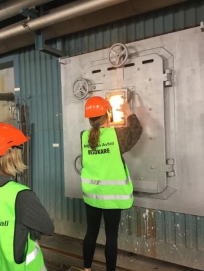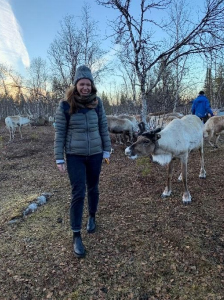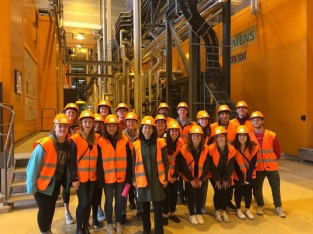2018-2019 Study Abroad Update
 Over the summer of 2019 over 400 studied abroad. These programs covered a wide range of interests and engineering schools. For the first time, students could also take core engineering courses from Purdue faculty abroad. Prof. Chuck Krousgrill taught ME 270 Basic Mechanics in Barcelona, Spain, and Prof. Jitesh Panchal taught ME 352 Machine Design I in Prague, Czech Republic. More core engineering classes are planned for summer of 2020 taught by Purdue professors during May. Locations and details will follow in the coming months.
Over the summer of 2019 over 400 studied abroad. These programs covered a wide range of interests and engineering schools. For the first time, students could also take core engineering courses from Purdue faculty abroad. Prof. Chuck Krousgrill taught ME 270 Basic Mechanics in Barcelona, Spain, and Prof. Jitesh Panchal taught ME 352 Machine Design I in Prague, Czech Republic. More core engineering classes are planned for summer of 2020 taught by Purdue professors during May. Locations and details will follow in the coming months.

Among the program offerings for May 2019 was Sustainability across Sectors-Sweden, led by Prof. Inez Hua of EEE and CE, and assisted by Jill Churchill of Global Engineering Programs & Partnerships. The students traveled from Kiruna, in northern Sweden to Gothenburg in the south. Along the way students toured sites such as the famous Ice Hotel, Stockholm City Hall, and even spent a day with the Samí people, the indigenous reindeer herders of Swedish Lapland. The Samí explained how climate change is affecting their herds from feeding to their yearly winter migrations. Students also toured the LKAB Iron Ore mine, Invercote Paperboard, Kinnarps Furniture, and Gothenburg Energy, learning about their sustainability practices and environmental policies.

As described by Prof. Hua:
“The program, "Sustainability across Sectors-Sweden" is an opportunity for engineering students of all majors to learn about the impact of engineering processes on environmental sustainability.
In addition to the technical dimension, there are social and regulatory dimensions of environmental sustainability. Sweden and the United States rank differently in overall environmental performance. Students use their technical skills to understand and compare environmental impacts in each country. The program allows unique experiential learning about topics manufacturing, energy, water and wastewater treatment, urban food production, and transportation, all in the context of environmental sustainability. The students experience different contexts for environmental sustainability: they tour full-scale and pilot scale facilities, and hear about cutting-edge research. Students also apply material and energy balances and other scientific principles to some of the facilities that will be toured in Sweden, and they analyze environmental policies and technical solutions in Sweden, and comparison with the United States.”
